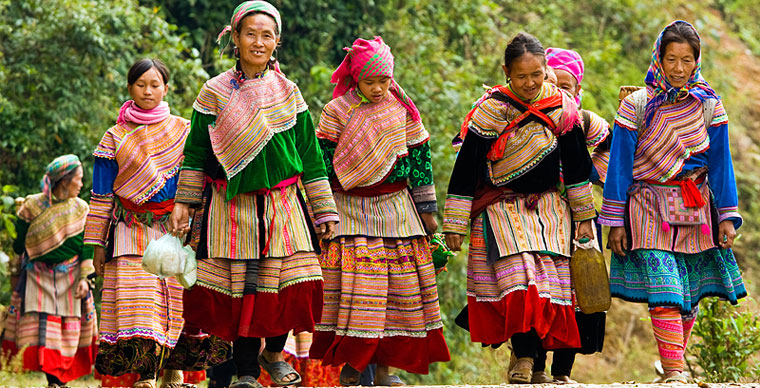
Bac Ha Vietnam: Top things to see and do
- on Mar 14, 2020 By: Ngoc Nguyen
Nestled in the mountainous region of Northwestern Vietnam, the little town of Bac Ha may not seem as bustling as Sapa or Ha Giang, yet it attracts just as many travellers owing to its discreet and authentic routes. A weekend visit is worth the detour, as it offers a beautiful escape between green mountains, rivers, caves, historic remains, and ethnic villages.
A glimpse of Bac Ha’s history
Located to the east of Lao Cai Province, around 70 kilometers from the provincial capital and 300 kilometers from Hanoi, the charm of Bac Ha lies not only in its picturesque landscapes and lively ethnic markets. Behind the pristine nature hides a rich and singular history, deeply linked to the traditions of the local ethnic groups and the social transformations of the country.
The name “Bac Ha” originated from “Pac Ha” in the language of the indigenous inhabitants. In the language of the Tay ethnic group, “Pac Ha” literally means “one hundred bundles of thatch”, a reference to traditional agriculture. During the French colonial era, this name was adapted by the French into “Parkha”, before evolving naturally into ‘Bac Ha’ in contemporary Vietnamese parlance.
When spring arrives and plum blossoms flourish, the vast valleys of Bac Ha transform into an idyllic tapestry of pristine white, earning the land the nickname “White Plateau” of Northwest Vietnam. However, this enchanting landscape was not always so peaceful.
Until the 1980s, the high plateaux of North Vietnam - particularly in the provinces of Lang Son, Lao Cai, Yen Bai, and Lai Chau - were infamous as the kingdoms of poppies, plants once grown for opium. It was only in 1993, thanks to the joint efforts of the local authorities and mountain communities, that the poppy fields were gradually replaced by plum orchards.
Today, these plum blossoms symbolize not only the rebirth of an area but also the determination of a people to embrace ethical, sustainable tourism that promotes local culture and ancestral traditions.
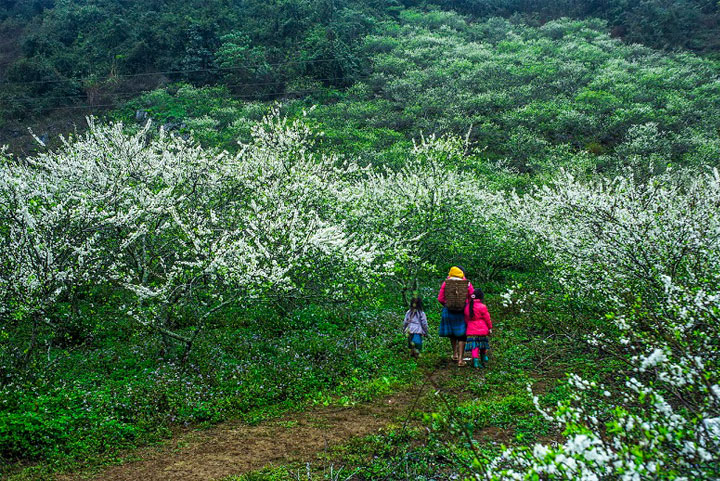
How to get to Bac Ha from Hanoi?
Getting to Bac Ha from Hanoi is an adventure in itself. For those who want to visit this unspoiled region, here are several options available to choose from, depending on your budget, schedule, and preference for comfort.
By Night Train
To travel to Bac Ha from Hanoi, the night train offers a fascinating journey. With this option, you will depart from Hanoi Railway Station and arrive at Lao Cai Railway Station after 8 to 9 hours. This option is appreciated by many travelers owing to its comfort and safety. Once you arrive in Lao Cai in the early morning, you will need either a private car or a local minibus to travel 70 kilometers through lush green valleys, which takes around 2 hours, to finally reach Bac Ha.
This transport option is ideal for travelers who want to combine comfort and immersion while avoiding long daytime journeys.
By Bus
You can either choose a tourist bus or a local bus. While certain companies operate a complete journey from Hanoi to Bac Ha, most routes involve a connection at Lao Cai. The total travel time is around 8 hours, depending on traffic and the type of bus chosen. Day and night buses are available, departing from My Dinh, Gia Lam, or Sapa Express in Hanoi.
Although more economical, this mode of transport is less comfortable, but it remains a popular choice for travellers on a tight budget or adventure-seekers.
An ideal combination: Sapa and Bac Ha
Many travelers combine Sapa and Pu Luong on their trip. By first following the well-known Hanoi - Sapa tourist route, you can enjoy a stay in the emblematic mountains of the North before heading for Bac Ha, just 3 hours away.
This option allows you to discover two complementary faces of northern Vietnam: Sapa, with its developed tourist infrastructure, and Bac Ha, more genuine and untouched.
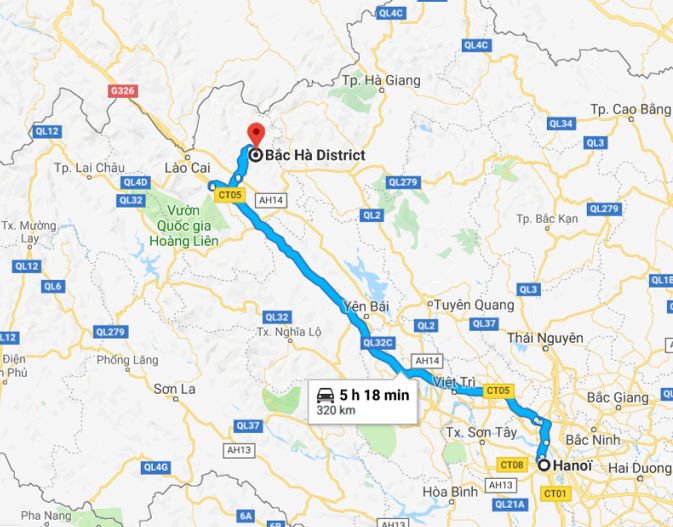
Best time to visit Bac Ha
While Bac Ha can be visited year-round, certain periods are particularly ideal to experience its enriched culture and natural beauty.
Spring: The season of flowering and traditional festivities
From January to March, Bac Ha’s hills are lit up by plum blossom, truly a spectacle not to be missed. It’s also within this season that the Lunar New Year takes place, and the villages are bustling with festive preparations.
In spring, the festival of worship to the genies of Earth and Water occurs, celebrated on the 15th day of the first lunar month. This festival unequivocally honors the spirits that safeguard crops and harvests, showcasing the community's deep-rooted beliefs and cultural connection to agriculture.
June: Horse races
The traditional horse races held in early June are both a sporting and cultural spectacle, showcasing the agility of the local horses and the enthusiasm of the villagers. They coincide with the ripe plum season, Bac Ha's signature fruit.
August: Bac Ha Temple Festival
The Bac Ha Temple Festival occurs every 7th day of the 7th lunar month, attracting the faithful and the curious. It's a time for recollection, traditional music and prayers in an enchanting spiritual setting.
What to visit in Bac Ha?
Bac Ha ethnic markets
Definitely a must-visit when in Bac Ha! Let yourself be carried away by the smells and flavors of the mountains and by its unique atmosphere.
A Sunday rendezvous for colorfully dressed merchants, the Bac Ha Market brings together no fewer than ten ethnic groups from the region and surrounding area. The place wakes up early in the morning as the men and women hurry around their selection of the week's goods to display. The market is made up of four halls displaying household goods, brocatelles, animals, and dishes, where you will find a wide choice of Bac Ha items and specialties from neighboring tribes.
Stop by the stalls filled with merchandise from field tools to buffaloes, horses, clothing, and souvenirs. Try to taste some typical dishes in the gastronomic hall, which, along with that of brocades, is in full swing all day.
If you arrive in Bac Ha on Tuesday, head for the Coc Ly Market, which is about 40 kilometers from Lao Cai City and is also worth a detour to immerse yourself in the local culture of the Hmong.
Hoang A Tuong Residence
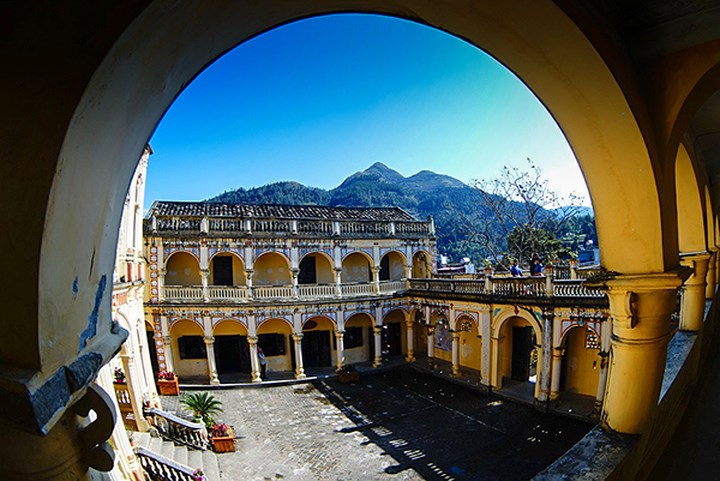
Taking 8 years to construct, from 1914 to 1921, and occupying four thousand square meters, the building of the most important family in Bac Ha at the time showcases a blend between French architecture from the 17th-18th century and the Tay stilt houses. Surrounded by mountains, the peaceful hill where Hoang A Tuong's residence stands offers picturesque views of the lush countryside. This beautiful place offers a memorable trip where many visitors come to stroll in a mystical atmosphere between nature and architectural harmony.
Valley of Flowers Thai Giang Pho
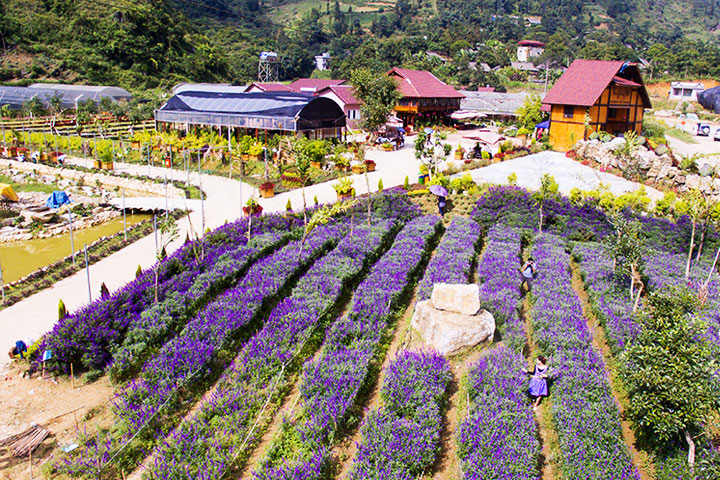
Only less than two kilometers from the center of Bac Ha, the Thai Giang Pho valley invites you to get lost in the bewitching world of scents and colors. Come here to marvel at the thousand and one orchids that bloom all seasons, or even cross the lavender fields for a very fragrant break.
If you are seduced by the pink-purple color of buckwheat, come and admire them at Po Cho 2 in Lau Thi Ngai commune, Airport 2 in Thai Giang Pho commune, and La Di Thang in Ta Van Chu commune. They are ideal for visiting during the major festivities, such as the 30 April festival and the horse races held at the beginning of June.
Ban Pho or Pho village
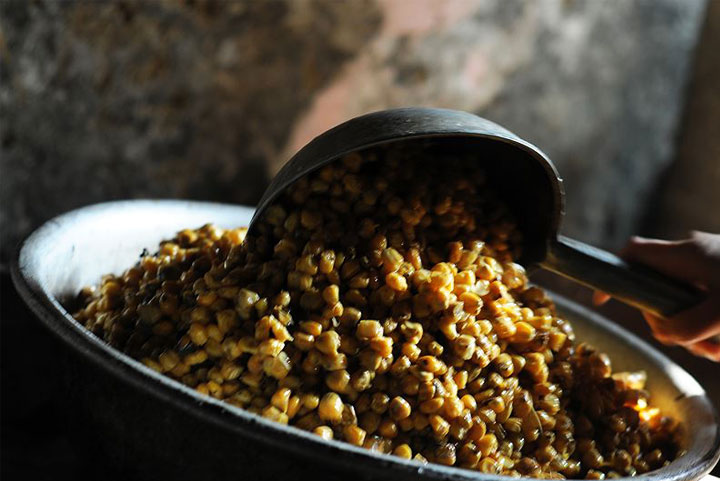
Located four kilometers from Bac Ha, the Pho village of the Hmong beckons you to taste its famous corn alcohol, known for its particular taste. Take your time visiting a local family who will surprise you with a friendly exchange. Immediately upon arrival, immerse yourself in the pleasant smell of corn that wafts all over the kitchen.
It is here that we make, according to the traditional Hmong method, corn alcohol, which is prized in particular in the weekly Bac Ha and Can Cau markets.
Hang Tien or Fairy Cave
Head for the River Chay, a six-kilometer boat ride away, and you'll find yourself in the heart of a primitive forest with a temperate climate and a relaxing setting between steep cliffs, towering trees, and babbling streams. This is where you'll find the Fairy Spring, which leads you after a couple of hundred meters to the Fairy Cave, which can accommodate a good hundred visitors. The area is shaped by different levels, forming a fascinating rock wall. Legend has it that fairies used to wander around here, never wanting to leave because of the bewitching scenery. It's up to you to explore it and see for yourself.
Bac Ha Temple
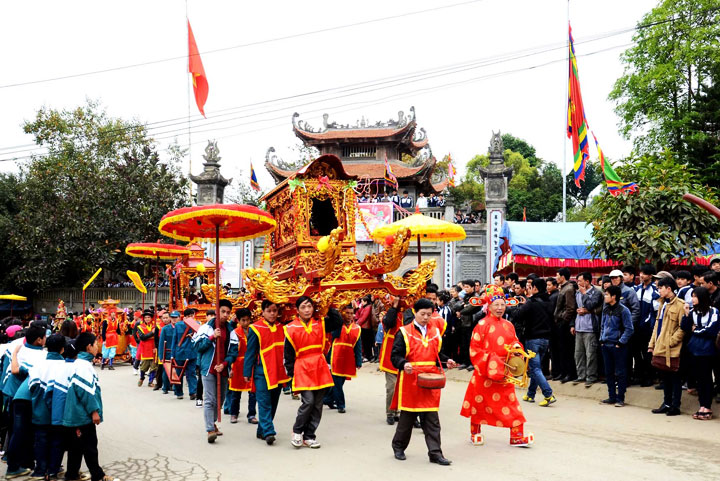
The Bac Ha temple dates from the 19th century and is dedicated to Vu Van Uyen and Vu Van Mat, two brothers to whom Bac Ha owes its regional stability at the time. The Temple Festival, which takes place on the 7th of the 7th lunar month to pay tribute to Vu's heroes, is also a high point of lively, fun-filled traditional festivities.
Accommodations in Bac Ha
Bac Ha District offers around 50 accommodations of various classes, from small family hotels to homestays, all promising total immersion in the heart of North Vietnam’s mountain ethnic groups.
Hotels in Bac Ha
Hotels in Bac Ha are located mainly around the town center. These establishments offer simple yet comfortable accommodation, often family-run. You'll find private en-suite rooms, sometimes with views over rice paddies or mountains.
Homestay in Bac Ha
For a more authentic experience, opt for a homestay when in Bac Ha. This option is appreciated by more and more travelers, as it allows better insight into the indigenous way of life and culture through activities such as sharing meals with the family and taking part in handicraft or farming activities.
Among the most welcoming villages for this type of stay are:
Pho Village, located a few kilometers from the town center, is surrounded by peaceful hills.
Na Lo (Ta Chai), renowned for welcoming Flower Hmong families.
Trung Do (Bao Nhai), a charming hamlet accessible by boat via the Chay River.
Na Hoi Tay and Na Hoi Nung, where the Tay and Nung ethnic groups live together in traditional stilt houses.
Dishes to try in Bac Ha
Through its cuisine, Bac Ha tells the story of its people, their customs, and the unique bond with nature. From “pho chua” soup to the legendary “thang co”, not forgetting the colorful sticky rice of the Nung Din, prepare yourself for an extraordinary gustatory journey.
Pho Chua (Sour Pho)
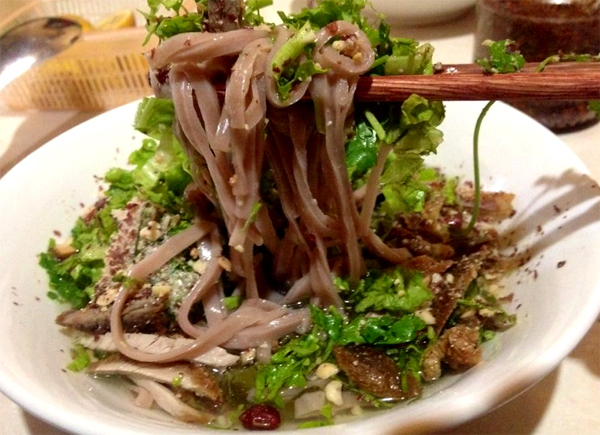
Unlike the famous Hanoi Pho, this regional version of Bac Ha is eaten cold and has a tangy taste, which promises to take any taste buds by surprise. This brothless Pho combines brown rice noodles, marinated pork, and a tangy sauce with fresh aromatic herbs and is topped with roasted peanuts.
Thang Co
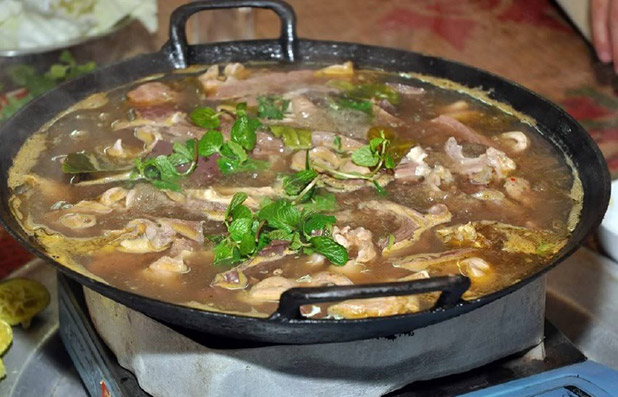
If you have ever learned about the culture of the ethnic minorities in the highlands of Northern Vietnam, you may have heard of this dish. A culinary emblem of the northern markets, Thang Co is an ancestral dish of the Hmong people, equally popular in Sapa, Ha Giang, and Lang Son. Originally prepared with horsemeat, today it can include beef or buffalo, simmered for a long time in a broth flavored with local spices, notably mac khen (wild pepper) and cardamom. Served boiling hot, often accompanied by a glass of corn alcohol, this daring dish is rustic, full-flavored, and culturally charged.
Five-color sticky rice
Among the gems of ethnic minority cuisine, the five-colored glutinous rice of the Nung Din is a marvel to behold. This spectacular dish draws its natural colors from local plants: wood leaves, tubers, and bark. Each color - from crimson red to saffron yellow - has a symbolic meaning linked to nature, the earth, or the ancestors.
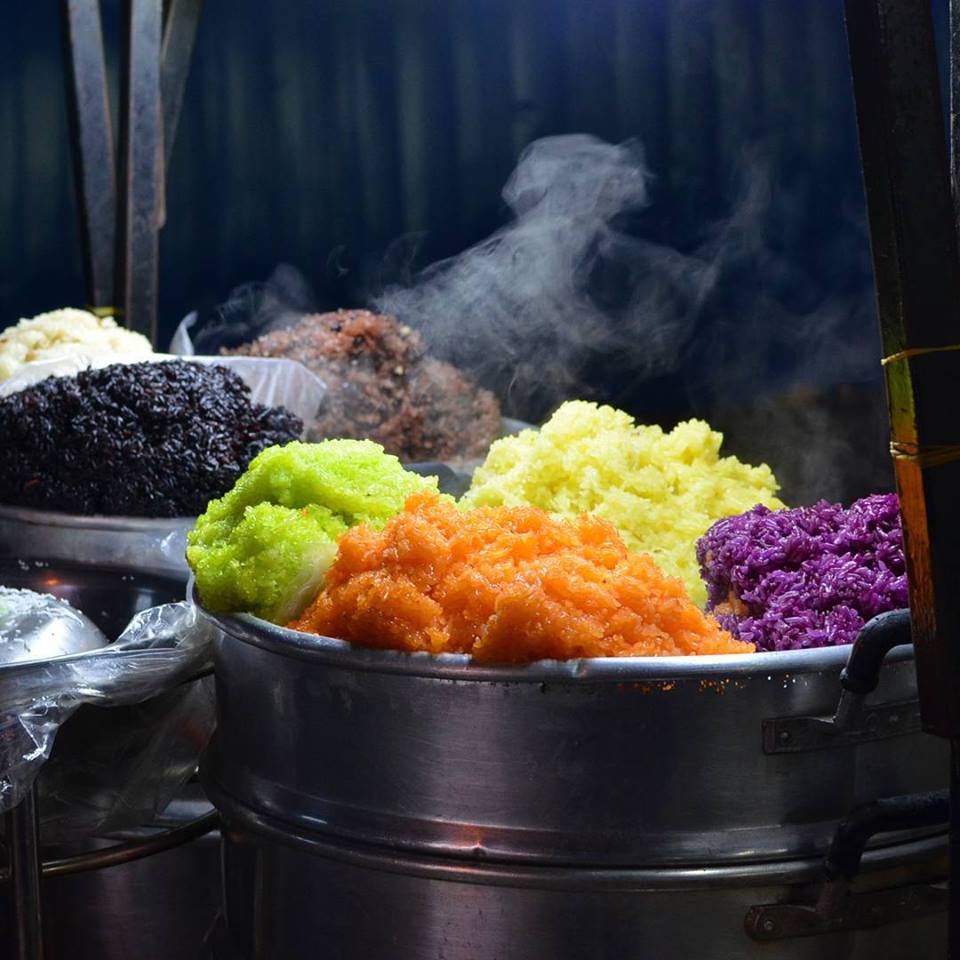
This dish is generally prepared for Tết (Lunar New Year) or major ceremonies. It often accompanies grilled or smoked meats in a spirit of sharing and celebration.
Young Sticky Rice
Another Bac Ha specialty is young sticky rice (or cốm), harvested early in the season, before the grain is fully ripe. It is then roasted, pounded, and eaten with sugar or coconut milk. Soft, mellow, and slightly sweet, this dish evokes the agricultural traditions of mountain people and their sacred relationship with the land.
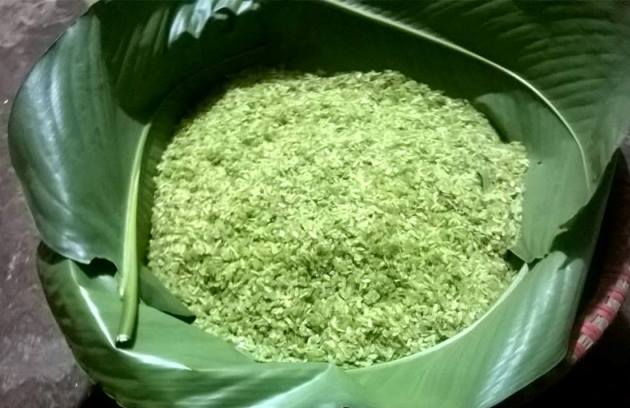
Served in small portions, often wrapped in banana leaves, young sticky rice is as much a delicacy as a symbol of abundance.
Related articles:
>> Visit Bac Ha in 1, 2 or 3 days, what to see and do?
>> Bac Ha market: A Vibrant Cultural Immersion in Northwest Vietnam
>> Tour in the Northwest of Vietnam : Where to go? Which itinerary? What to do? How many days?
 Español
Español Français
Français






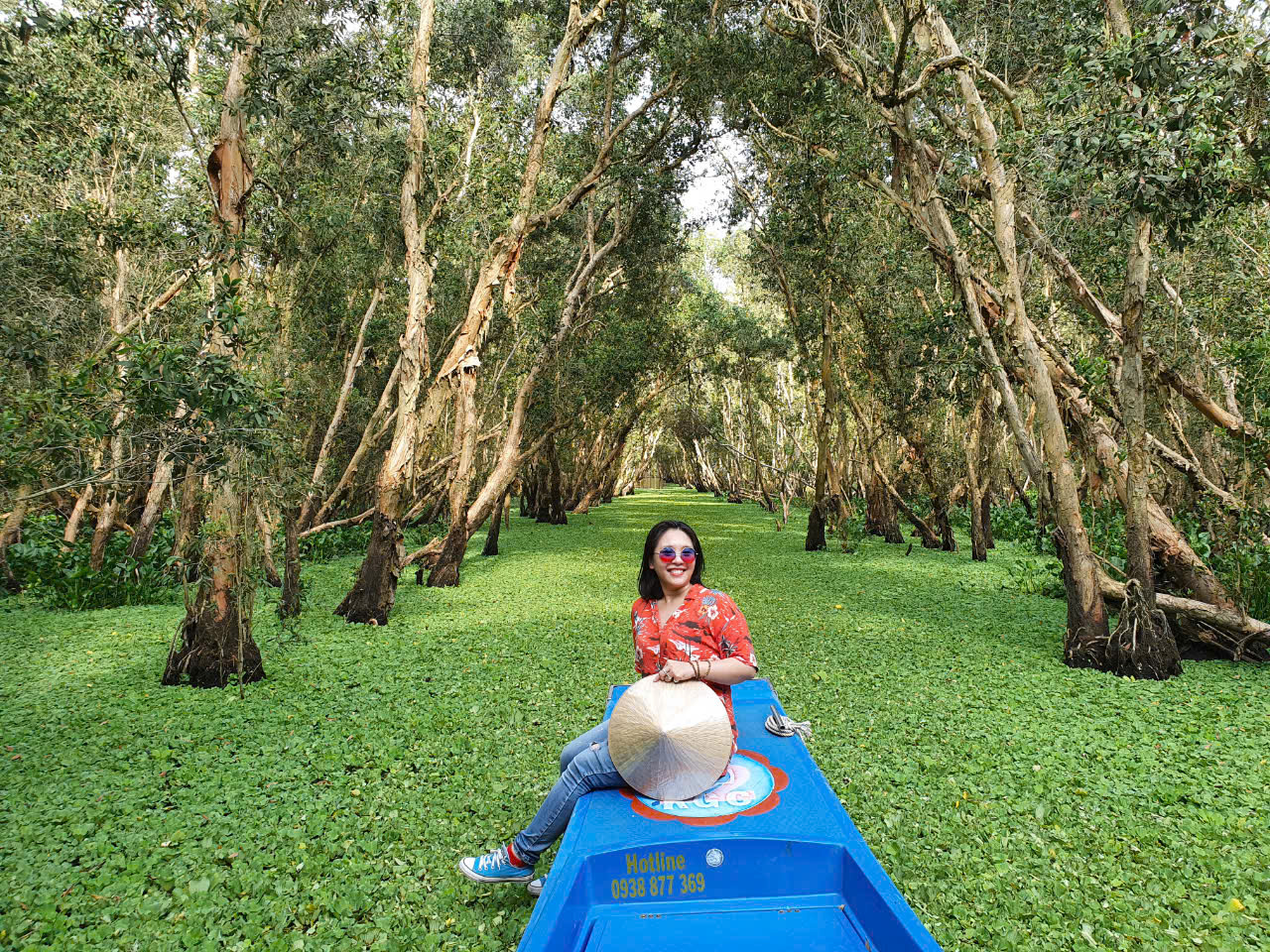
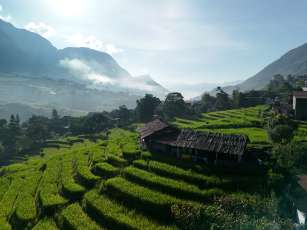
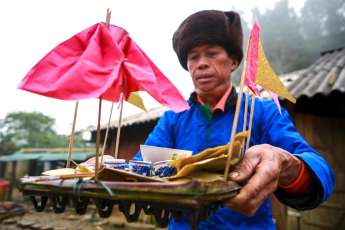
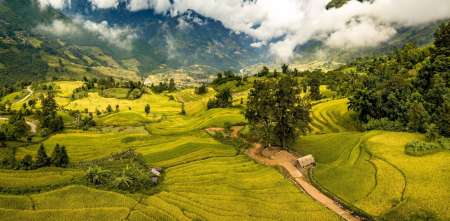
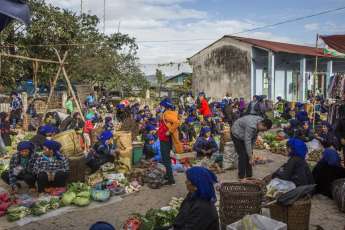
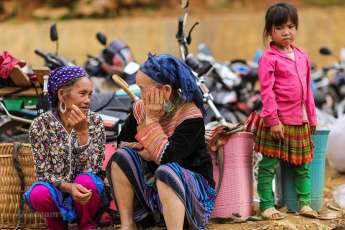
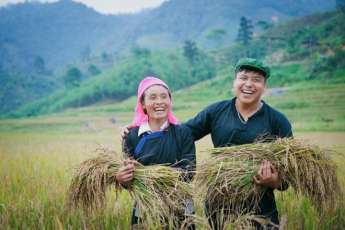


.png)




Timothy O Tool
on Feb 23, 2026Timothy William Groh
on Feb 23, 2026TwelmSC
on Feb 20, 2026Morgane Ter Cock
on Dec 18, 2025HerbertPhomaMS
on Oct 19, 2025